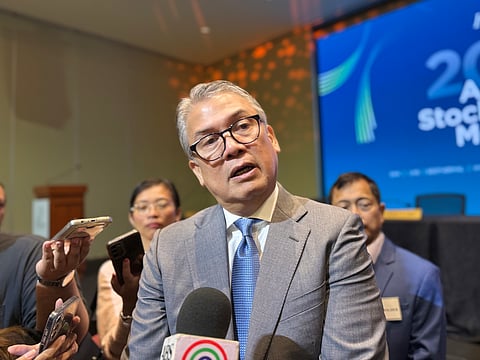
- NEWS
- the EDIT
- COMMENTARY
- BUSINESS
- LIFE
- SHOW
- ACTION
- GLOBAL GOALS
- SNAPS
- DYARYO TIRADA
- MORE

Lopez-led First Gen Corp. (FGEN) is calling on regulators — particularly in light of recent leadership changes — to uphold the moratorium on new coal plants, warning that lifting it could worsen the country’s dependence on imported coal and further distort the energy mix.
“We urgently need policy reform to encourage — not deter — clean energy investment,” FGEN president and chief operating officer Francis Giles B. Puno said during the company’s annual stockholders meeting on Thursday. He emphasized the need for stronger public-private collaboration to overcome systemic barriers to critical energy projects.
“We must continue to enforce the coal moratorium, reversing the concerning trend of coal exceeding over 60 percent of our power mix from coal supply that is substantially imported from countries such as Indonesia and Australia,” Puno said.
Puno noted that the country’s energy reserves are under strain from aging plants and surging electricity demand driven by extreme heat and rapid economic growth.
“In recent years, we have faced an increasingly challenging power situation. The country’s dwindling reserves are symptomatic of aging power plants struggling to respond to drastically increasing power demand,” he said. “These are not business issues, but extremely important national issues which require the need for stronger, more collaborative partnership.”
According to Puno, regulatory and market obstacles make it difficult to sustain investment in key infrastructure, including geothermal, hydro, LNG, and new power plants.
“There are regulatory policies and market mechanism structures that make critical power investments difficult to sustain,” Puno said.
Among the other reforms he urged were a review of market price caps that “compress margins and scare off much-needed investments,” as well as stronger government backing for long-term offtake deals, viable project structures, and credit guarantees to drive major energy projects.
He also pushed for improvements to the competitive selection process to create “more balanced commercial terms to power generators and investors,” and called for the long-overdue implementation of Retail Competition and Open Access (RCOA), a key provision of the Electric Power Industry Reform Act.
“Finally implement the much-delayed RCOA, 24 years after the Electric Power Reform Act was signed into law — allowing for more customers including households to choose their electricity provider,” he said.
FGEN is investing around $601 million this year to expand its clean energy portfolio, with roughly 90 percent allocatedto its subsidiary, Energy Development Corp. (EDC). Most of the spending will go toward geothermal projects, including drilling activities and battery energy storage systems. The remaining budget will support the development of other clean energy assets under FGEN’s broader portfolio.
The company’s renewable energy portfolio includes nearly 1,200 MW of geothermal capacity through EDC, around300 MW of hydropower, and 160 MW from wind and solar. It also operates 2,017 MW of natural gas-fired power plants to help balance the intermittency of renewables and ensure grid stability.
